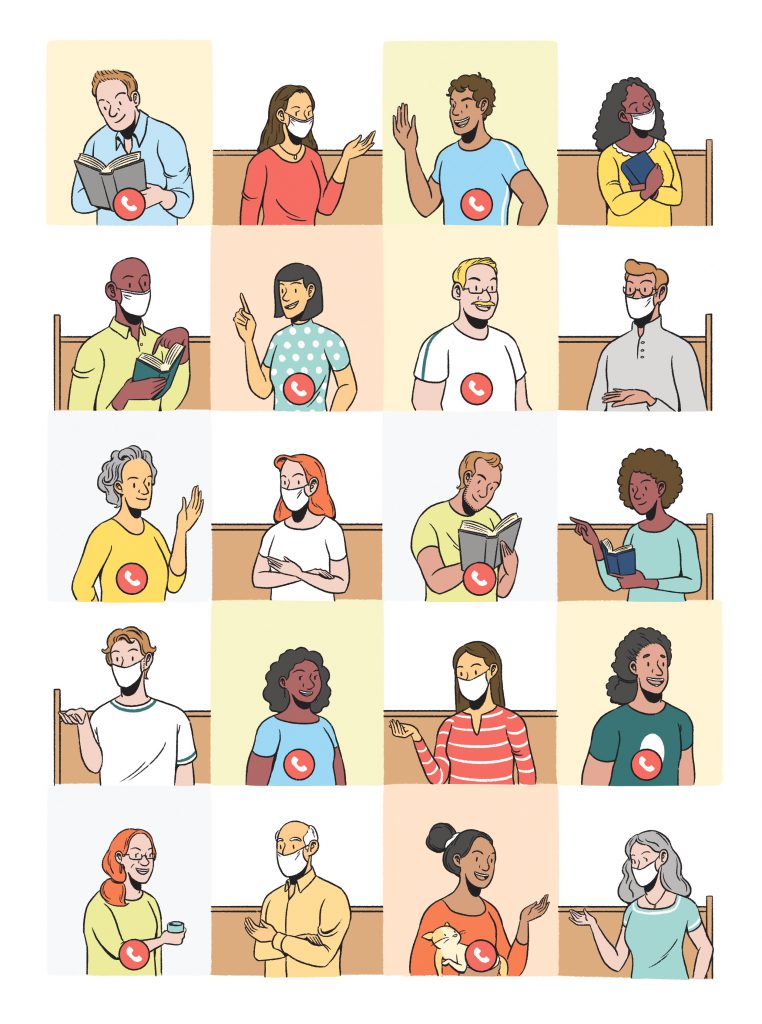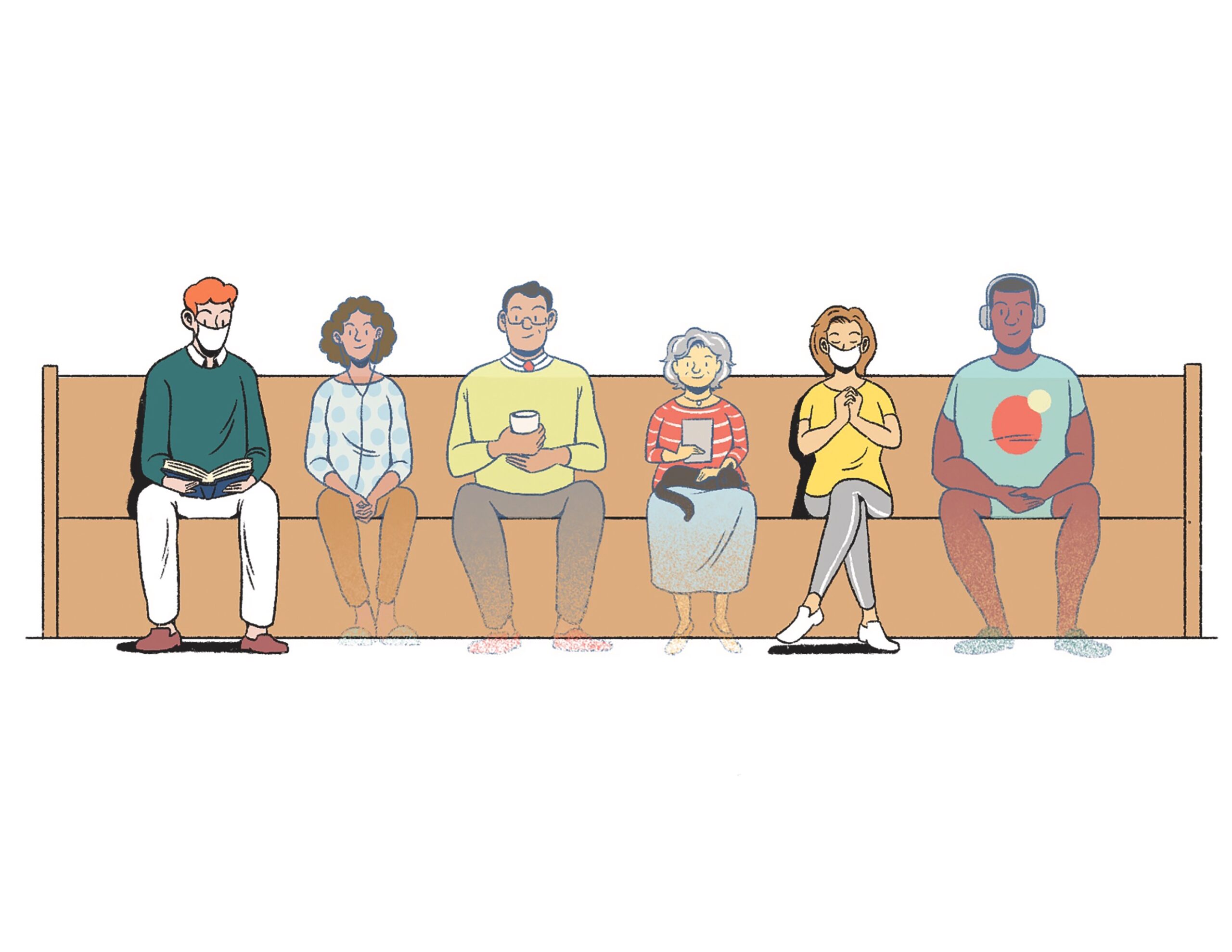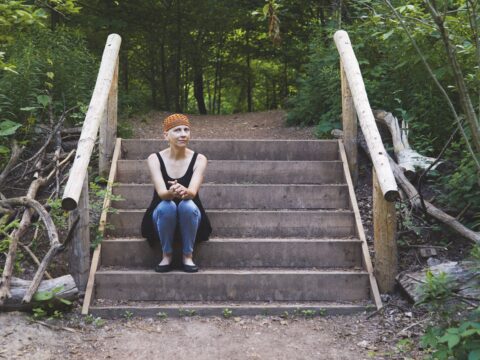Pastor James Coates stands in his pulpit, a basic lectern against a plain wall. He has short ginger hair and wears a dark suit, a crisp white shirt and a striped red tie. With the confident cadence of an experienced preacher, he systematically lays down a manifesto for civil disobedience against government edicts forbidding a full sanctuary of in-person worship during the COVID-19 pandemic. “I am doing what I’m doing in obedience to Christ,” he proclaims. “For the first time in my ministry, the government is reaching into the life of the church.”
It’s a mid-February Sunday morning at GraceLife Church in Spruce Grove, Alta., a little west of Edmonton. The sermon today is a companion to one Coates gave in December on the definition of church, of gathering, of essential. To accept virtual services, he tells the congregated members, who cannot be seen in the YouTube video posted by GraceLife, is to lose “essential elements of worship” and erode the meaning of church itself. He views public health orders as an injustice against Christians for faithfully adhering to scripture. “When the government forbids what God commands,” he says, the local church “can’t comply with that.”
You may unsubscribe from any of our newsletters at any time.
Coates is one of a small number of pastors who regard in-person worship as a divine calling. His strong views dominated news coverage of churches earlier this year. Most evangelical pastors have not taken up his call for disobedience (he says they have “a deficient approach to scripture”), and the great majority of Christians reject his position. Regardless, many church and congregation leaders would agree the pandemic months have forced faith communities to ask the same questions that underpin Coates’s sermons: what is church, and what does it mean to be essential? Amid the upheavals of COVID-19, some, like GraceLife, have felt oppressed by restrictions, while others, much to their own surprise, have found a renewed sense of mission and connection.
Prior to this Feb. 14 service, Coates had received legal orders to comply with Alberta’s public health act. On Feb. 16, he turned himself in to the police. He spent 35 days in jail after refusing to accept the terms of his bail, namely that he refrain from holding services that defy health orders. In April, authorities seized GraceLife Church for failing to comply with restrictions. According to news reports, the congregation went underground, meeting and worshipping in secret locations.
Coates appeared in court in May for the first portion of his trial, where he argued that the enforcement of public health restrictions against him violated the Canadian Charter of Rights and Freedoms. Judge Robert Shaigec ruled on this charter challenge in early June. “The question today is whether the purpose, manner, or effect of enforcement of that law… violated James Coates’s religious freedoms? The answer is no.”
Shaigec explained how courts interpret the charter: “Canada is diverse and polycentric. Competing rights must be respected, accommodated and balanced.… Individual rights and freedoms are not absolute.”
A judge in Ontario made a similar point in another church case. The Toronto International Celebration Church had asked the attorney general to overturn a public health order that only 10 people could be present for worship, even in a building that could host a thousand. In denying the church’s request for a temporary exemption to the order, the judge wrote, “I find that, in the short term at least…the harm that would be caused to public health in Toronto…outweighs the harm being suffered by the Church and its members.
Peter Youngren is the founding pastor of Celebration Church. He speaks to me via teleconferencing from a sunny room in his home. He is an affable fellow, with an easy manner and a ready laugh. Now 66, he has been an entrepreneurial evangelist for decades, founding his first ministry in his early 20s. Prior to the pandemic, he travelled the world preaching to gatherings of thousands. He started Celebration Church in 2000.
“It’s not like, ‘You can’t be a good Christian unless you go to Sunday services,’ which some have maybe presumed is what we were saying with our lawsuit. Not at all,” he says. The case was about “equal treatment” for churches. “The box stores being open, is that essential?” he asks. “Actually, we can make an argument that it’s not — that people could do only curbside. We weren’t making a medical argument either about COVID-19 — which is a severe threat of course to our society and to people — or even a theological statement. [The basis] was equality under the law.”
Youngren says his legal team asked the government’s experts why they chose a limit of 10 people in a church. The answers, he recalls, were “flimsy.” Youngren believes the people making health rules don’t understand churchgoers. “We don’t think they are purposely trying to attack the church,” he says. “We think they are just ignorant of us.”
Youngren and Toronto Celebration Church complied with the court’s decision and have not exceeded the allowed numbers. When Ontario allowed in-person worship to resume at 15 percent of the building’s capacity, they paid a cleaning company to sanitize the church between services. Throughout the pandemic, they have offered Sunday worship online. He says givings are slightly down, but decent. His church has used government wage subsidies to meet some payroll needs over the past year.
“We don’t think they are purposely trying to attack the church. We think they are just ignorant of us.”
Still, the rules irk. “We try to teach scripture in a way that puts the responsibility on the person to maintain their faith in Christ,” Youngren reflects. “But many people also need the support of other people. We’ve had a number of stories of people who were overcome with depression, suicidal thoughts. Maybe they had loved ones, family members, who were hooked on opioids.… And that’s one of the big questions about this period of multiplied lockdowns: What has been the damage? What has been the price, socially? What is the suicide rate? What is the addiction rate? What is the domestic abuse rate?”
A poll released in May by the Canadian Mental Health Association (CMHA) and the University of British Columbia stated that 77 percent of adults “report feeling so-called negative emotions as a result of the COVID-19 pandemic.” Another 40 percent said their “mental health has deteriorated since [the] onset of the pandemic.” Suicidal thoughts and feelings were reported by eight percent, slightly down from 10 percent in the organizations’ fall 2020 survey but still much higher than in previous years. The Canada Suicide Prevention Service reported a 200 percent increase in the number of calls it received in 2020 compared to 2019.
According to the May survey, Canadians are finding different ways to cope with the pandemic. Some healthy — exercise, walks, connecting virtually with family and friends. Some not so healthy — compulsive online shopping, increased eating, increased substance abuse. Religious communities are not mentioned in the survey.

This type of omission is a common frustration for faith workers who want to be part of the wider conversation. Studies like the CMHA’s not only inform the news cycle but are often used to determine public policy. Youngren describes the lack of religiosity among elected officials as “a great shift in our country,” and one that has had consequences during COVID-19. Neil MacCarthy, the director of public relations and communications for the Catholic Archdiocese of Toronto, says that governments have been reluctant to assign “essential” status to churches and faith communities, understanding that different people have different priorities.
The archdiocese has been holding its own during the pandemic. Even so, members are critical of the seemingly arbitrary rules from Ontario public health officials. The 225 churches in the archdiocese have followed all government orders, but as MacCarthy says, “having a hard cap of 10 or 25 or 50 is not equitable in terms of places of worship themselves. You have churches or mosques or synagogues that seat a thousand.… Having an arbitrary number [doesn’t] make a lot of sense.”
In response, the archdiocese launched the campaign A Place to Worship. More than 13,000 people petitioned their local member of provincial parliament to “reopen houses of worship, safely.” On the mid-April morning I spoke with MacCarthy, Ontario further tightened restrictions, and church capacity was again reduced to 10 people from 15 percent of total capacity.
When the capacity was higher, MacCarthy says, volunteers across the archdiocese cleaned the churches between mass. For those people, being present and participating in the life of the church was very meaningful. “Faith, to many, is essential,” he says. Some of those who really want to come to church are seniors and people with health issues. “They’re praying, and they feel they want to connect spiritually.”
Other volunteers have done incredible outreach work, adds MacCarthy, and parish staff “have been heroic in calling hundreds of people [to check in] and offering new and creative ways to evangelize.”
The archbishop, Cardinal Thomas Collins, has offered a livestreamed mass almost daily from St. Michael’s Cathedral Basilica in Toronto. “I just got a letter yesterday from someone in Texas who has been watching,” says MacCarthy. Another 100 churches in the diocese have also been doing livestreaming. “There’s obviously the stress and anxiety that everyone’s feeling, but there’s also some hope.”
Yet there is one thing, critical to the Catholic mass, that cannot be replicated by virtual worship. “The idea of receiving the eucharist, the body of Christ, is the pinnacle of our faith experience as Catholics,” says MacCarthy. “That is a real challenge for us, but again, it’s balanced with the fact we’re in a pandemic.”
“Faith, to many, is essential.”
The National Catholic Broadcasting Council has for decades offered a televised mass to people who are shut-in. The mass includes a virtual eucharist with a prayer that says, “Since I cannot now receive You sacramentally, come at least spiritually into my heart.” It is not the same as receiving the elements from a priest, acknowledges MacCarthy, but “it is a core teaching of who we are.”
Rev. Shannon Mang had an unfortunately close experience of the pandemic in its earliest days, when she was minister at Living Spirit United Church in Calgary. On March 15, 2020, four days after the World Health Organization had declared COVID-19 a pandemic, the congregation celebrated a milestone birthday for a much-beloved member. Forty-two people were present. A month later, 22 had tested positive for the virus, three were hospitalized and two died. The birthday event adhered to provincial guidelines at the time, and Mang was paying attention to Alberta public health officer Dr. Deena Hinshaw. “I really thought that we could just be careful and wash our hands, and stay apart,” she says. “I thought that we had some control over this disease.
By that Sunday in March 2020, Living Spirit had already been through years of turmoil. Mang was brought in a couple of years back as an intentional interim minister, a spiritual guide to help the congregation make a faithful decision about its next steps.
In the aftermath of the outbreak, the church mourned online. “As we were walking through the tragedy together, we had to see one another’s faces,” says Mang. “Zoom was essential” for offering that connection.

But the pandemic was ultimately one trauma too many for Living Spirit. The congregation, which had been exploring a partnership with another Calgary church, decided to disband. “We use the wilderness image a lot in intentional interim ministry,” says Mang. “In the closing months, October, November, December, part of the conversation was, ‘We’ve learned how to navigate in the wilderness.’”
Rev. John-Peter Smit also thinks of the pandemic as a time of wilderness or exile for the church — a Babylon moment “where we sat down and wept.” He describes it as a sudden acceleration of the “discourse of loss” that has been the reality of the Christian church in Canada over the past half-century.
Smit is a congregational consultant with an Ontario synod of the Presbyterian Church in Canada. His work has taken him across the province listening to elders and ministers express their hopes and anxieties over the future of the church, local, national and international.
“It’s tough for us to imagine anything other than getting back to [a past glory],” he says. But he doesn’t think you can be missional in the Promised Land. At its core, “the Gospel is really not about [personal] salvation,” he continues. “In fact, to think of salvation apart from my neighbour is to misunderstand salvation.”
During the pandemic, some Christians have grabbed headlines with their sense of persecution. He refers to this as “the whining of churches”: “I have rights,” he mimics. “It’s all about me.” Instead, Smit has been longing for a different conversation to bubble to the fore. “The thing that is stunningly absent to me is any conversation about the Christian’s moral imperative to care for their neighbour,” he says. “I believe we need to be in Babylon to take seriously what it means to be God’s people.”
The Babylon church says we need to move forward to what God is calling us to do. “Babylon was not a choice,” he adds. “When we find ourselves where we did not expect to be, we are in a position to be a missional church.” The pandemic has been that unexpected place for faith communities.
Life under lockdown “is actually quite the opposite” of church, says Rev. Wendell Gibbs. “The virus is transmitted based on everything that church is: fellowship, gathering, touching, hugging, speaking, shouting, screaming with each other, having food.”
The screen capture behind Gibbs on the video-conferencing call is of First Baptist Church, where he has served as the pastor for 11 years. The 195-year-old congregation is one of the oldest Black institutions in Toronto, and the oldest Black Baptist church in the city. It was founded by a dozen people who had fled slavery in the United States. Over the past half-century, says Gibbs, it has had a large influx of Black Nova Scotians.
“Rather than [the church] seeing itself as an essential service,” he asks, “how about seeing that you are an essential servant? You have essential servitude. In this pandemic, how can you still serve but not be part of the problem?”
Gibbs was in Guyana when the World Health Organization declared the pandemic on March 11, 2020. There was no Sunday sermon that first week, but he was able to work out worship on March 22 using a conference call service that allowed congregants to dial in. He preached from away while trying to get home. Since then, First Baptist has used different platforms to livestream. The number of people watching now exceeds the 200 who used to come on a Sunday morning to the sanctuary. There are worshippers from across the United States and even Brazil.
Mission has been at the heart of the congregation and has not abated during the pandemic. For Christmas, the church distributed 350 grocery gift cards. It has continued to financially support its work in the Congo and Rwanda. “I believe it’s an essential servanthood that maintains how we serve humanity, how we serve the community, how we become participants in the solution,” Gibbs says.
“Rather than [the church] seeing itself as an essential service, how about seeing that you are an essential servant?
He thinks the pandemic, and the racial anxieties that have affected his congregation particularly, contributed to this sense of servanthood. “We are social beings. We need contact. We need communication,” he says. “We are Zoomed out, yet we are still creating an environment of connectivity.”
“Is church essential?” Rev. Stephen Milton echoes my question. “Our congregants have shown that they think it’s an essential service.… All the things we associate with church — the building, the pews, the being in person, the singing in person, the praying in person, the sermons in person, the coffee time in person — all that, they had to give up. And yet they still show up [online] in higher numbers than we ever saw before.”
Milton is minister at Lawrence Park Community Church, a United church in an economically comfortable part of Toronto. He started his second career as clergy in June 2019 after a successful run as a filmmaker. When the pandemic hit, the church stopped in-person gatherings. It transitioned to livestreamed worship, from the sanctuary or from Milton’s home. He was almost late to our online meeting due to a mid-week virtual service that ran long. “People want to hang around and talk to each other about things that really concern them,” he says. “One congregant had a relative who was sick. We offered prayers.” Milton says they keep coming back every week “so that they can feel plugged into God and plugged into each other.”
Like many churches that are livestreaming, Lawrence Park is attracting more worshippers than it previously did in person. Someone watches for new names each service and contacts them via the chat function. If they show interest, Milton follows up during the week. People have turned to faith communities during the pandemic. And givings have kept pace as well.
“In this pandemic, how can you still serve but not be part of the problem?”
“I’m finding people are taking time to dig into the Bible like they never have before. And the conversations are really rich,” Milton says. The church’s meditation group used to draw eight women to weekly meetings. Now it’s 22 or more, on Zoom.
Virtual worship may have encouraged the interpersonal relationships many seek from their church. “Everything on Zoom is in close-up,” he says. “I have a better sense of who you are than if you were dressed in a suit walking into some neutral corporate space.”
The pandemic stripped church bare to its core as a hub for relationships. While some congregations protested their right to gather, others found new ways to connect and care for each other, beyond the pews and around the world. In the midst of the global trauma, these churches helped tell another story, one of resilience and community.
It has been a challenging year and a half, but not without moments of grace. Much of the noise we chased was dimmed. It was quiet for a long time, and in the silence, we heard the call of our own loneliness, and also that of our neighbours, our friends. Many of us turned to God to amplify the call, and to church to respond to it. In this sense, the pandemic was not the worst of times; and in the long run, it may prove to have been the most essential period of our lives.
***
Andrew Faiz is an associate editor at Broadview.
This story first appeared in Broadview’s September 2021 issue with the title “Essential Services.”















My church went on Zoom right away and it really works for most of the church members. The service is recorded and sent out each week by email, the sermon on paper, is mailed to any one else who asks for it. We have ‘coffee’ after the service, which is not recorded, people talk about their ups and downs if they want or other news they want to talk about. We feel we know each other better and everyone agrees that we want to keep this service going. Only the Music Minister gets to sing the only negative of the service, but we mostly sing along. We now have a Thursday at 3 church service n the church. I don’t understand why some churches are making a fuss, religion is about people not buildings.
Andrew. I think the effects of the lockdown on individual congregations that did online worship but did not attempt to gather physically within the government imposed covid constraints has yet to be seen. You might want to revisit this in a years time. One thing I do know is this. If church leaders do not believe that the body of Christ as a principle must encourage the physical gathering of its believers is essential than why would church leaders think the rest of society should think church is essential is essential?